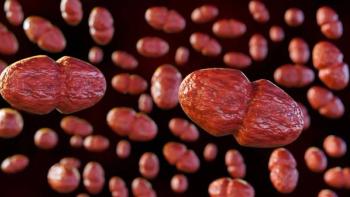
C. Difficile
Latest News

Evolving Challenges in C difficile Testing: Diagnostic Stewardship or Laboratory Retrogression?

MAD-ID 2025 Highlights Fidaxomicin’s Role in Reducing C difficile Recurrence
Latest Videos

CME Content
More News

At MAD-ID 2025, Rachel M. Kenney, PharmD, discusses treatment shifts, microbiome innovations, and pharmacists' roles in optimizing outcomes.

Paul Feuerstadt, MD, discuses the treatment’s overall safety and efficacy profile and provides insights on data around smaller subsets of patients with comorbidities.

Paul Feuerstadt, MD, discusses the safe and effective use of RBL in preventing C difficile recurrence with positive physician feedback and high patient benefit

Phase 3 data link gut microbiome shifts to better mental health outcomes in patients treated with fecal microbiota, live-jslm.

Environmental contamination plays a larger role than previously recognized, prompting calls for updated infection control strategies.

Lumen Bioscience’s LMN-201 was considered safe and well tolerated, and there were no severe dose-related or serious adverse events reported.

Fecal microbiota transplantation emerges as the top treatment, while probiotics show limited effectiveness in preventing CDI recurrence.

Nature Medicine published additional data on Vedanta Biosciences’ Clostridioides difficile investigational therapy, VE303, from its phase 2 trial.

CEO Larry D Sutton, MD, PhD, elaborates on the company's strategy and the science behind SIDIPREV to prevent C difficile infections in hospitalized patients.

Here are some of the bigger stories on this topic from this year.

Investigators at the University of Virginia are examining the potential link between the “sympathetic” nervous system and the role of the seriousness of the infection.

This week, recent studies show progress in healthcare, including an mRNA vaccine for C difficile, the rise of antimicrobial resistance, peer-assisted telemedicine for hepatitis C in rural areas, and more.

Joseph Zackular, PhD highlights targeting high-risk groups for vaccination and shares insights into the future of mRNA vaccine development for C diff.

Vedanta Biosciences offered further insights on its completed phase 2 trial for its novel therapeutic, VE303.

This week, evolving COVID-19 inpatient care protocols with ECMO and remdesivir, FDA breakthrough designation for a rapid sepsis test, E coli outbreak linked to iceberg and romaine lettuce, and more.

Study found that VRE colonization is linked to higher mortality, increased need for mechanical ventilation, and renal replacement therapy, while MRSA and C diff colonization showed less impact.

This week, a Mayo Clinic study found that removing C diff from gastrointestinal pathogen panels reduced unnecessary treatments, a Salmonella outbreak was linked to cucumbers, and a hepatitis C therapy achieved a 98% sustained virologic response in non-cirrhotic patients, among other developments.

Daniel Ilges, PharmD, BCIDP discussed this improved diagnostic stewardship, reduced unnecessary treatments, and had no impact on diagnosis timelines.

Using fecal microbiota transplantation within the CGA framework further enhanced survival and care efficiency.

Here is a recap of the latest happenings during C diff awareness month.

In recognition of C difficile Awareness Month this November, the CDC's 2023 HAI Progress Report highlights continued progress in reducing CDIs across US healthcare settings.

Reduction of in-hospital rate of C difficile infection from 11% to 4%, with no increased risk of infection following treatment.

This week, food recalls due to Listeria monocytogenes contamination and, a study comparing treatments for recurrent C difficile infections underscore the need for further research, policy adjustments, and more.

17 randomized controlled trials involving 4,148 patients assessed the efficacy of various treatments, finding that fecal microbiota transplantation via the lower gastrointestinal route was the most effective.

From improving infection control and antibiotic stewardship, identifying RT 027 as a risk factor for vancomycin resistance in C diff, developing a universal flu vaccine, better management for drug-resistant pathogens, and more.







































































































































